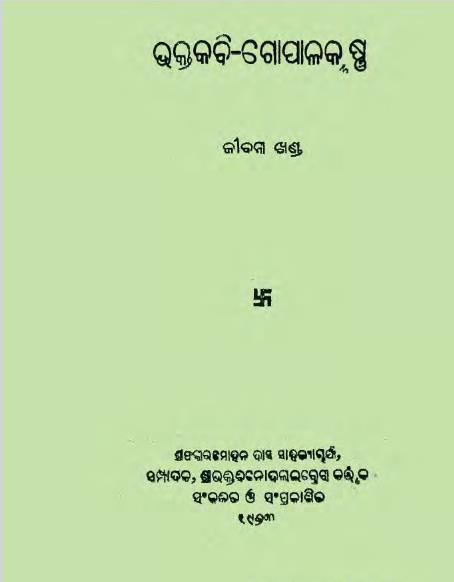In the rich tapestry of Odia literature, one name that stands prominent is that of Gopalakrushna, affectionately known as Bhaktakabi Gopalakrushna. His contributions to Odia poetry were not just profound but also deeply intertwined with the spiritual essence of Odisha. Born in the late 19th century in the village of Shankarpur, Gopalakrushna emerged as a voice of devotion, expressing his faith through lyrical poetry that resonated with the lives of ordinary people.
Gopalakrushna’s upbringing was steeped in the cultural and spiritual ethos of Odisha. Growing up in a region that celebrated the art of devotion and Bhakti, Gopalakrushna naturally gravitated towards themes of spirituality and love for the divine. His family’s involvement in religious practices and community gatherings exposed him to various devotional traditions, sowing the seeds for his poetic journey. After his early education, he chose to dedicate his life to the pursuit of Brahma-Jnana (knowledge of the divine), actively participating in spiritual discourses and community services.
His literary career, particularly in the realm of devotional poetry, took off in the early 20th century. Gopalakrushna was profoundly influenced by the principles of the Bhakti movement, a religious revivalist movement that emphasized personal devotion to God rather than rituals and dogma. Like many of his contemporaries, he believed that divine love and devotion could transcend societal boundaries, a theme that is vividly depicted in his works.
One of the most notable aspects of Bhaktakabi Gopalakrushna’s poetry is its accessibility. His verses were characterized by simple yet powerful language, drawing heavily on the vernacular of the common people. This made his poetry relatable and appealing to the masses, thereby allowing the teachings of devotion to permeate deep into the hearts of the Odia populace. His works often focused on the life and teachings of Lord Krishna, celebrating the divine romance between the human soul and God, which resonated with the cultural affection for Krishna in Odisha.
His collection, Bhagabata Bhasha, stands as a testimony to his literary prowess, where he translated classic texts into Odia, making them comprehensible to the layperson. These translations were not merely linguistic exercises; they were imbued with Gopalakrushna’s fervent devotion and reverence for the divine, transforming them into devotional hymns that stirred the hearts of his readers and listeners alike.
Throughout his life, Gopalakrushna sought to bridge the gap between the divine and the mundane. His writings reflected his belief in the transformative power of devotion, advocating for a life lived in sincerity, compassion, and unwavering faith. He often portrayed God not as an abstract concept but as a loving companion who walks alongside every devotee, understanding their joys and tribulations.
Gopalakrushna’s legacy is immortalized in the hearts of countless Odias who continue to celebrate his contributions to literature and spirituality. His poetry remains relevant, inspiring new generations to seek a deeper connection with the divine. In 1963, Fakir Mohan Das penned an essay on Gopalakrushna, capturing the essence of Bhaktakabi’s life, beliefs, and literary significance, ensuring that his legacy would continue to resonate in the cultural consciousness of Odisha for years to come.
In sum, Bhaktakabi Gopalakrushna stands as a luminary in Odia literature—a devotional poet whose heartfelt expressions of faith have inspired countless souls and enriched the spiritual and literary heritage of Odisha. His life and works remind us of the power of devotion and the enduring bond between the devotee and the divine.
Books Info
| Books name | Bhaktakabi-Gopalakrusna/ଭକ୍ତକବି – ଗୋପାଳକୃଷ୍ଣ |
| Author | Fakir Mohan Das |
| No Of pages | 74 |
| Publisher | Sri Phakir Mohan Senapati |
| Publication | 1963 |
| Printed At | Sri Radhika Press |
| Distributor | NA |

